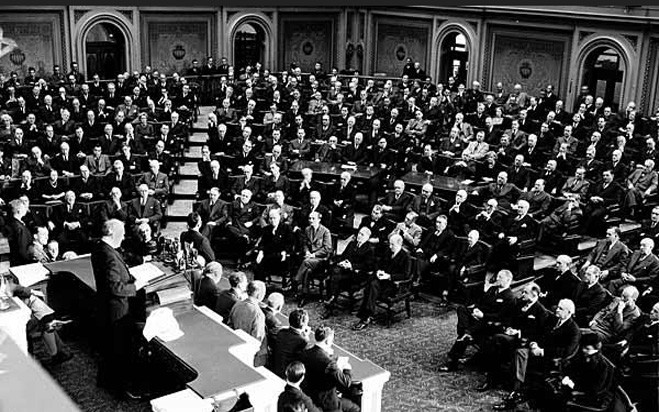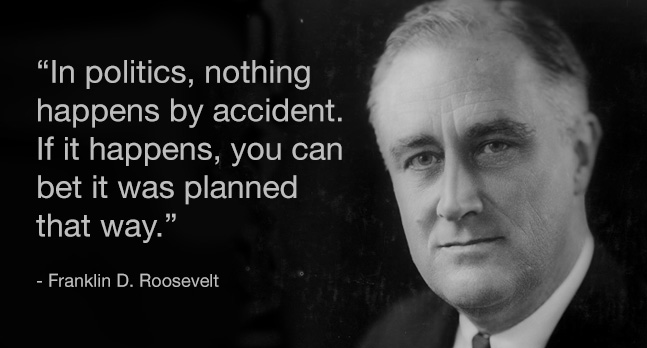
He got it.
Ex-President Herbert Hoover, said, “We have only one job to do now, and that is to defeat Japan.”
But to friends, Hoover sent a different message: “You and I know that this continuous putting pins in rattlesnakes finally got this country bit.”
Hoover kept remarkable notes of developments leading up to the Second World War and the years beyond, using his inside contacts, and personal connections.
70 years after Pearl Harbor they have finally been published as: “Freedom Betrayed.”
It is a scathing indictment of Roosevelt and the men around him who lied about their desire to keep America out of war, all the while taking deliberate steps to maneuver us into conflict.
The book includes memoirs and documents from both America and Japan, shown week by week, to prove Hoover’s case.
For example, in the summer of 1941, Japan was bogged down in a war with China it could neither win nor end, and having expanded into Vietnam, Japan saw itself as having bit off more than it could chew.
Prime Minister Konoye desperately wanted to make a peaceful settlement with the United States approval, as did the Navy officers who had fought alongside U.S. and British sailors in World War I.
But the Japanese Army, led by General Tojo and Foreign Minister Matsuoka, were bitterly anti-American, so Konoye replaced Matsuoka with the pro-American Toyoda.
Roosevelt’s response to this positive step by Japan was to freeze all Japanese assets in the United States, and end all exports of oil to Japan, on which it depended.
Stunned, Konoye still pursued his peace policy and offered to meet Roosevelt on the U.S. side of the Pacific to hear and respond to U.S. demands.
The U.S. Ambassador implored Roosevelt not to ignore the offer, and that the prince had convinced him an agreement could be reached on Japanese withdrawal from Central China.
On Aug. 28, Japan’s ambassador presented Roosevelt with a personal letter from Japan’s Prime Minister imploring him for a meeting.
Tokyo begged to keep the offer secret, as if it were known that the Japanese prime minister was offering to cross the Pacific to appease the Americans, it could imperil his government.
Five days later, someone ‘leaked’ the letter to the press.
On Sept. 6, Konoye met with the American Ambassador to tell him that Japan now agreed with the Americans demands as the basis for peace.
No response.
On Sept. 29, the ambassador sent what Hoover describes as a “prayer” asking Roosevelt not to let this chance for peace pass.
On Sept. 30, the ambassador wrote to Roosevelt, “Konoye’s warship is ready waiting to take him to Honolulu, Alaska or anyplace designated by the president.”
No response.
On Oct. 16, Konoye’s government fell.
In November, Tokyo made two new offers for peace: a Plan A for an end to the China war and occupation of Indochina and, if that were rejected, a Plan B, where neither side would make any new move.
Both rejected without discussion.
After a Nov. 25 meeting with Roosevelt, Secretary of War Henry Stimson’s noted: “The question was how we should maneuver them into … firing the first shot without allowing too much danger to ourselves.”
“We can wipe the Japanese off the map in three months,” wrote Navy Secretary Frank Knox.
From the refusal to meet Prime Minister Konoye came the bombing of Pearl Harbor, thousands of dead Americans, atomic bombs dropped on Hiroshima, Nagasaki, the fall of China to Mao, and U.S. wars in Korea and Vietnam.
Was December 7th, 1941 a day that will live in infamy? Yes. But it was a date of Roosevelt’s own making.
If you want to know the real history, spend a week with Mr. Hoover’s book.
Related Story: The Impeachment of Franklin Roosevelt


An interesting article offering a differing perspective on Roosevelt and Hoover, but however one attempts to revise history something stands out startlingly clear. Japan had begun a systematic incursion into China since 1931, and if about 1939 they realized – oops, we have overreached ourselves, perhaps? – the butchery in Shanghai could not be overlooked, forgotten or casually ignored. Hypocritically assessing Roosevelt’s ‘silence’ to Japan’s overtures to save them from themselves, and thereby triggering worldwide events afterward is nothing short of ludicrous.
A different viewpoint? Admittedly. Roosevelt’s infamy? Hardly. As for Hoover . . . pretty much someone who could neither understand the powers of his presidential office when he held them, and was unbelievably timid when it came to implementing controls over a runaway I.O.U market exchange, proves naivete on a colossal scale.
You can get this book if you like, and reread history as though you’ve never studied it before, or you can just wander through old news articles, films and editorials that will remind us all just how dangerous the world really is, and if you’re unprepared . . . crying in your beer is not going to help.